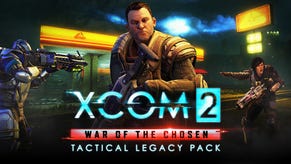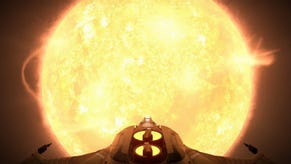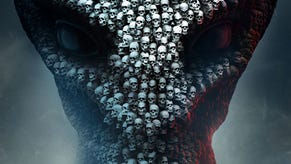Interview: The Death of Interceptors, Iron Man Mode, and XCOM 2's Next Step
Director Jake Solomon offers insight into XCOM 2's design decisions.
This article first appeared on USgamer, a partner publication of VG247. Some content, such as this article, has been migrated to VG247 for posterity after USgamer's closure - but it has not been edited or further vetted by the VG247 team.
Now that XCOM is well-established, what's the next step? That's the question that Firaxis has had to wrestle with for their follow-up to 2012's critically-acclaimed XCOM: Enemy Unknown, which helped to revive tactics as a triple-A genre.
I delved into that question a bit when I previewed XCOM 2 last week. Now here's the full interview with director Jake Solomon, who talks about some of the more interesting design choices in XCOM 2, including the decision to drop interceptors and the decision to let the aliens be victorious.

USgamer: Can you believe how much times have changed? I remember the days when people were like "XCOM? A strategy game? Strategy games never work! That can’t be a triple-A game!" And now look at this: XCOM 2...
Jake Solomon: (laughs) I do remember those days, I do remember those days… luckily, we were always spared because we had Sid [Meier] in-house, so we were like the one odd duck out. But yeah, now it’s totally different, and it’s awesome. What’s cool is seeing other titles that are seeing a resurgence with turn-based games and tactical games; that part is something I’ve really enjoyed.
USG: I’ve just got to say thanks so much for not doing Terror from the Deep again.
Solomon: It's not going to happen! I’ve made my feelings on that one known! You know, it's funny, because I’ve played that one, and I’m playing it as I’ve played all XCOM games, but that one to me – I feel like because of the water setting... XCOM works because of the Earth setting, and then it’s like "aliens are weird because they’re on Earth, so we should put it in the future." We didn’t want to make it seem too futuristic, because then I think that the player loses any sort of emotional connection to what it is they’re fighting for. Terror from the Deep was pretty weird; you’d be underwater and just like, "I’m not sure where I am, I could be on a space planet right now."
USG: So just to confirm, this is kind of an alternate-history scenario, it’s not the true canon?
Solomon: Yeah, I view it as – you can already hear the designer bullshit coming out in my voice, but – this is the way I view it, and I think it’s fair, when we were talking about this idea we were like,"You know, the setting for XCOM 2 is actually going to be if XCOM lost the first game." And I think a lot of people had this reaction of, "Wait a minute, I just invested all this time and I beat XCOM." To me it feels like every time you start a new game of XCOM, you’re kind of spinning off an alternate universe – and so, in the worlds where you beat XCOM, there just never was an XCOM 2, you know? This is just in case somebody actually lost a game of XCOM, which has happened, and this is a chance to go to that world and try it out.
USG: It seems like you’re taking the original game and just piling a ton of new systems on; it almost feels like the success of the original has given you the confidence to be like,"Yeah, we’re not worried about the complexity, we’re going to make this even deeper."
Solomon: That is very true. It’s interesting because when you make something like when we were making – three years ago, let’s say; we were making Enemy Unknown – whether or not there was even an audience, we didn’t know for sure, right? They obviously didn’t have the feedback – they haven’t been able to say, "We don’t like this, we don’t like this…" And so making that game is very different because you just start guessing, like "What’s too much? What’s not enough? I don’t know, we’ll just have to use our own values." But with XCOM 2, we're now where it’s like, "Okay, millions of people have played the game and now we have their feedback," and so now we can say, "They were happy with it, it had some success, and so now it’s a much safer place to say, "Well, we can respond along the lines of all this feedback we got; the things they like, the things they didn’t like, we can actually make something we think people are okay with." And you’re right, a lot that has come out is our feeling that, "Okay, we don’t have to worry about peoples’ reception to something that is that deep and that complex, like that’s something that didn’t turn out to be a problem for anyone at all."
USG: I remember in the original game you expanded your base as you went, right?
Solomon: Yeah.
USG: But this base seems ready-made.
Solomon: Well, it’s – so yeah, you’re right. It’s fewer slots, it’s twelve slots, so the way it changes is that you’re still excavating parts of the ship, clearing out old alien debris to put your stuff in there. The way it works is that you have fewer slots for facilities, more optional facilities, and then the facilities themselves can be upgraded. So now you have to choose: you have facilities, and you have to upgrade them, and then on top of that is the staffing element. So then you can also upgrade them by putting staff in them, so now the game is more about staff and moving your staff around and upgrading certain facilities and things like that.
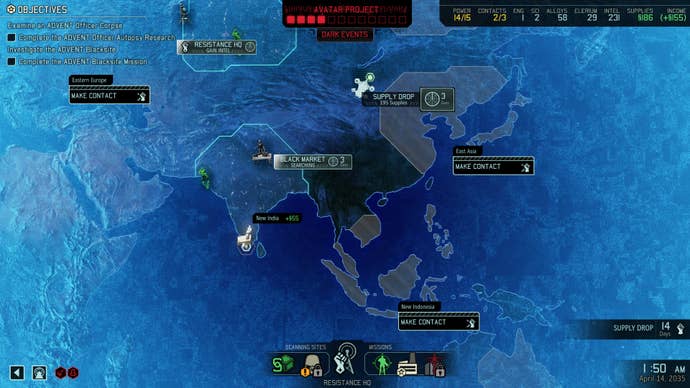
USG: What about interceptors?
Solomon: No, no fighters. This one is more "the only ship you’ve got is the one you’re flying around."
USG: Why did you decide not to go with interceptions?
Solomon: Well, because I think that what we had before was basically kind of a mini-game, and so I felt like it didn’t fit as well with the theme, which gave us an opportunity to start fresh with some of these things. We said, "Well, that one doesn’t work that well," and we weren’t that thrilled with what we did in Enemy Unknown, so we said, "Alright, let’s instead take the effort and put it somewhere else."
USG: A big part of the original original from the early 90s was being able to put your base in the right place so it could make interceptions.
Solomon: We’ve got radar, and I think the radar range is right. With the very first game, it was all about basically putting them in the right place so you can get the radar range so you can make the countries – the right countries – happy. You know, the ones that pay you all the money – you gotta make the right countries happy.
USG: And that element carried over into the most recent one.
Solomon: Yeah, I mean, that inspired a lot of the idea of having satellites and then staffing interceptors around the world.
USG: But now you’re rebels, so you’re not worried about going bankrupt...
Solomon: Basically, what we’ve decided to do is take the Enemy Unknown formula and kind of go the opposite direction, so Enemy Unknown kind of had the world, and then you slowly were losing it piece by piece. And then in XCOM 2, you have nothing as you’re building them up one by one. Like, nobody is on your side, and you’re slowly building them up, one by one. And so it’s just this sort of -- the idea was that in XCOM 2, XCOM is actually the invaders because the aliens rule Earth, and so we’re kinda taking everything and said, "Alright, we’re getting out of these different mechanics where you start from nothing, because you’re actually the ones going out attacking these locations and doing all the things that you had to respond to in Enemy Unknown, you’re now triggering in XCOM 2.
USG: So I assume that there won’t be any alien invasions of your base...
Solomon: Weeeeeell, actually there are. Yeah, so actually they can shoot down the Avenger. When they shoot down the Avenger – if they shoot down the Avenger -- then you have to defend it, and it’s actually a really hard mission, and so if you lose that mission, the game is over, because obviously that’s your base.
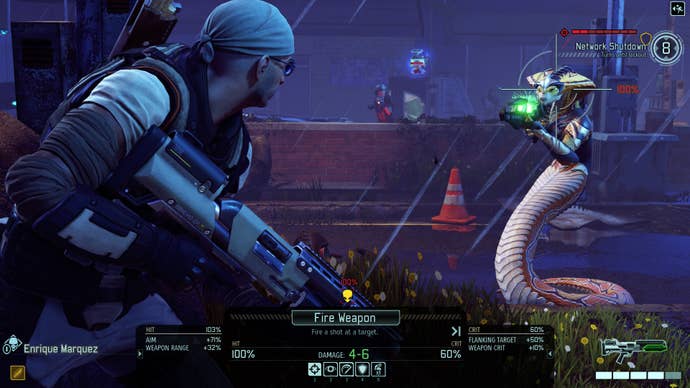
USG: So the aliens seem to have a little more agency in this one?
Solomon: Yeah, that is fair to say. I mean, we definitely wanted to make them feel more active on the strategy layer, so they build. They have the dark events, and then they have their own condition, and they build alien facilities around the world that you can eventually make contact with those regions and then take them, take those facilities out. And that’s what sort of slows down the aliens’ progress. And those are all optional missions that you kind of weigh against all the other things you wanna do, but at some point, the aliens have all these facilities out there and they’re racing towards victory, and you have to take some of those out.
USG: Oh yeah... no, you’re right; you really are the aliens.
Solomon: That’s right, you are! Yeah!
USG: You’re infiltrating, and you take the bases out.
Solomon: It was fun, because we thought some people ask, "Oh, you should make a game where you play as the aliens," and I think that that’s – I understand why people would say that, but I don’t know that that would work, because you don’t have a lot to emotionally connect with. If you’re the aliens and you’re just invading the Earth, I think that’s fine for a short game, but over a long term, they’d be really difficult to create some sort of emotional connection for the player to be like,"Yes, I’m invested in this." So instead we’re like, "Well, this is one way to do it," is to say like we don’t have Earth any more, so now you have to attack the powers that be because you’re a resistance group.
USG: The original had a Iron Man Mode, which turned out pretty well....
Solomon: Yeah, it did! Yeah, surprisingly well, and it’s back for sure, but it’s interesting because the unpredictable nature of XCOM 2 makes Iron Man more difficult. It definitely has these more peaks and valleys in terms of difficulty, because things were just more unpredictable. So if a couple of things don’t go your way, which is way more uncommon in XCOM 2. So Iron Man is definitely a little more challenging in XCOM 2, and it’s really purely down to the fact that the game is more unpredictable.
USG: It was pretty hard in XCOM.
Solomon: Yeah, no, I agree. I’m not much of an Iron Man player, to be honest with you.
USG: There's kind of a point of no return in the original Iron Man mode where if too much of your squad dies you're screwed and that's that.
Solomon: Yeah, it’s true, in the sense that at a certain point, you are facing... a really challenging part of the balance in XCOM, you want soldiers to be powerful as they are promoted, and so what that means is that for the difficulty curve, it has to rise, the aliens have to get tougher at the same level. And then if the player loses too many of their core experienced soldiers, then it becomes really difficult to pull off victory with a bunch of rookies, because they just cannot compare to experienced soldiers. Yeah, it’s true; that is probably the difficult thing about Iron Man: if you lose experienced soldiers, then it’s very difficult. Now, we knew of some ways to offset in XCOM 2, so now in XCOM 2, you can actually recruit scientists, engineers, and soldiers every month. You can go to resistance HQ and you can actually recruit new staff, and so there are always experienced soldiers available if you’re willing to pay for them.
USG: What else have you learned about the tactics genre since the first Enemy Unknown?
Solomon: Man, a lot, a lot. It’s been interesting, and the learning hasn’t just been through what we’ve done, there’ve just been a lot of interesting tactics games that’ve come out. I mean, I’ve not been able to play Invisible, Inc, which is something that I really want to play. But yeah, I mean I think that tactics – what we’ve kind of learned is that tactics really works best, and turn-based is best, because if it’s turn-based and the player has complete control then you can make the stakes very high.There are two things you have to do: you have to make sure that you’re communicating all the information to the player that they’re going to use, and then you have to make sure that the player has complete control over what they can control, and that way, the player feels that the experience is fair. Basically, it’s like a sport: you’re saying "these are the rules." The unique thing about tactics games is that it’s kind of a sport, these are the rules, and then it needs to be fair. And the player experience is such as that they will accept loss; they’re going to accept loss as long as they view the experience as fair. If they don’t view it as fair, nobody’s accepting any loss.
USG: You mentioned that there are a bunch of good tactics games that’ve come out lately, it must be flattering to you that so many of them have used XCOM as like a direct inspiration.
Solomon: Yeah, it’s neat, and I think the team, everybody is always excited when somebody says "it’s XCOM meets something else." I’m always in favor of that because the reason we make this kind of game is because this is the kind of game I grew up loving, this specific game, but having more of these games is nothing but exciting for us. You know, it’s just I hope it does something to foster the audience and sustain the audience. I think that we’re all like – it’s really cool to see what other people do with it, whether it’s massive challenge or something like Banner Saga or Invisible Ink or Hard West. There’s all these titles that have come up lately where you just – it is really very, very neat to see.
USG: So the tactics genre is alive and well.
Solomon: That’s right, alive and well. Thank God, after – you know, it’s been a while. But it’s back, you can’t keep it down.





